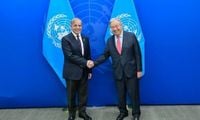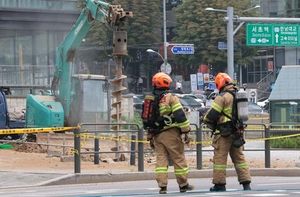On May 7, 2025, tensions between India and Pakistan escalated dramatically as India launched a significant military operation, dubbed "Operation Sindoor," targeting nine terrorist hideouts in Pakistan and Pakistan-administered Kashmir. This operation came in retaliation for a recent terrorist attack in Pahalgam, Jammu and Kashmir, which had raised alarms and heightened security concerns across the region.
Pakistan's Prime Minister Shahbaz Sharif condemned the strikes, labeling them a "cowardly act of war" and asserting that Pakistan has every right to respond forcefully. In a statement shared on social media platform X (formerly Twitter), Sharif emphasized that the entire nation stands united with its armed forces, stating, "Pakistan has every right to respond forcefully to this act of war imposed by India, and a forceful response is being given." His words reflect a deep-seated resolve to counter what he described as an aggressive act against Pakistan.
Sharif revealed that the Indian strikes targeted five specific locations within Pakistan, confirming that the attacks occurred at multiple sites. He stated, "Pakistan's land was attacked at five locations," adding that the Pakistani army and the nation are prepared to deal with the enemy, ensuring that their nefarious intentions will not succeed. This sentiment echoed throughout the country, with reports indicating a surge in national morale and unity in the face of perceived aggression.
As the news of the strikes broke, chaos ensued in Pakistan, with reports of civilian casualties emerging. The Pakistani military confirmed that Indian missiles struck key areas, including Kotli, Muzaffarabad, and Bahawalpur. Following the strikes, Pakistan took immediate precautions, closing its airspace and grounding flights at major airports, including Lahore and Sialkot.
In response to the unfolding situation, Sharif convened a meeting of the National Security Committee (NSC) in Islamabad, scheduled for 10 AM local time. This high-level meeting aims to assess the current crisis and determine Pakistan's strategic response. According to Information Minister Attaullah Tarar, the NSC will involve top military, intelligence, and civilian leaders, indicating the seriousness of the situation.
Meanwhile, the Indian government defended its actions, asserting that the operation was a restrained and calibrated response to the terror threats emanating from Pakistan. Indian officials maintained that the strikes were focused solely on terror infrastructure and were executed with precision to avoid civilian casualties. The Indian Army characterized the operation as a necessary measure to enhance national security and counter terrorism.
The backdrop of this military exchange is a long history of conflict and tension between India and Pakistan, often rooted in territorial disputes and cross-border terrorism. The Pahalgam attack, which spurred this latest round of military action, was a stark reminder of the persistent threat posed by militant groups operating in the region. India has long accused Pakistan of harboring terrorists who target Indian interests, a claim that Pakistan vehemently denies.
In the wake of these developments, international reactions have begun to surface. Observers are closely monitoring the situation, as the potential for escalation remains high. The United States, through President Donald Trump, expressed awareness of the situation, stating, "We heard about it as we were going into the Oval Office. I think people knew something was going to happen, given the past events. They have been fighting for decades and centuries. I hope it ends soon." This statement underscores the global concern regarding the stability of the region.
As the conflict unfolds, both nations are on high alert, with military forces prepared for further developments. The Line of Control (LOC) has seen increased military activity, with reports of ongoing fire exchanges between Indian and Pakistani forces. Pakistan's military has described the Indian strikes as cowardly, yet it has also stated that it is prepared to respond decisively.
In a statement following the strikes, the Indian Ministry of Defense reiterated that its actions were aimed at neutralizing terrorist threats and that no Pakistani military installations were targeted. The ministry emphasized that the operation was executed with restraint, reflecting a commitment to minimizing civilian harm while addressing security concerns.
As the situation continues to evolve, both nations find themselves at a critical juncture. The international community is watching closely, with calls for restraint and dialogue echoing from various quarters. The potential for diplomatic solutions remains, but the current atmosphere is charged with hostility and mistrust.
In conclusion, the recent military actions underscore the fragile state of relations between India and Pakistan. The repercussions of these strikes will likely resonate for some time, shaping not only the immediate security landscape but also the broader geopolitical dynamics in South Asia. As both nations navigate this tumultuous period, the hope for peace and stability remains a distant aspiration amid ongoing tensions.





